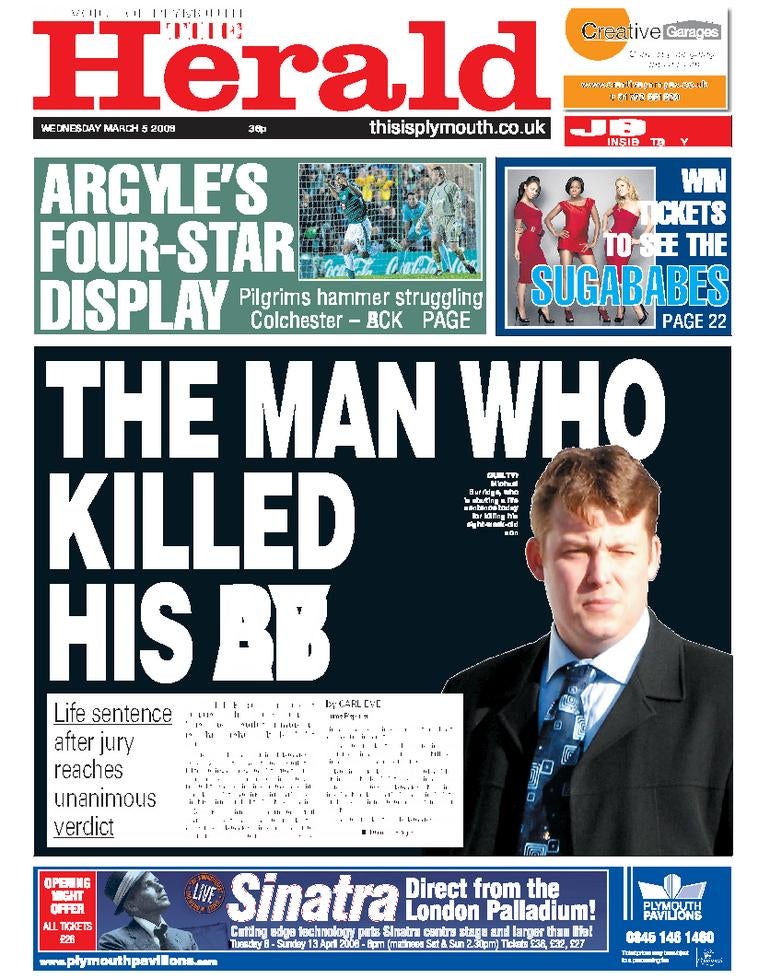
The Plymouth Herald has scored a victory for press freedom by successfully overturning an invalid reporting restriction on the infant sister of a murdered baby.
The paper brought in a specialist barrister, Anthony Hudson of Doughty Street Chambers, to fight the unlawful order and cited a case from earlier this year where the Croydon Advertiser and others fought for the right to name convicted paedophile Raymond Cortis, whose children had been made the subject of an invalid order to protect their identity.
On 4 March ex-soldier Michael Burridge, 28, was found guilty in Plymouth of killing his eight-week-old son Rees in a fit of temper. But the judge, Mr Justice Royce, had earlier imposed a gagging order under Section 39 of the Children and Young Persons’ Act 1933, specifically relating to Burridge’s two-year-old daughter.
As a result, the press could not report that when first arrested Burridge had asked police whether his daughter could be responsible for Rees’s injuries.
He claimed that weeks before his death, she had been seen holding Rees up by his neck, but medical evidence heard by the court dismissed the possibility that such an injury could have caused his death.
The paper argued that the daughter – now aged three and a half – was not ‘concerned’in proceedings and could not be the subject of a gagging order under the act.
On 28 February the Herald’s crime reporter Carl Eve asked the judge to lift the order and cited the Crypydon Advertiser case.
That case went to the Court of Appeal where a panel of judges ruled that section 39 orders cannot be used to protect children not concerned in the proceedings.
The judge, said he was aware of the Croydon case but he still refused to lift the order.
The paper’s solicitors, Foot Anstey, unsuccessfully argued that the order was invalid and requested it was changed so case could be reported.
Editor Bill Martin decided to bring in Anthony Hudson to challenge the order which was lifted on 4 March
In a seperate gagging bid, Devon County Council sought to protect the child’s identity via an injunction. Following the judge’s ruling it agreed to amend that injunction, enabling the paper to report the facts surrounding Burridge’s daughter.
The judge refused to order the council to pay the paper’s costs of dealing with the injunction, and it was also with thousands of pounds to pay in fees with regard to the Section 39 challenge.
Solicitor Nigel Hanson of Foot Anstey said: ‘As happens time and again when the media challenge reporting restrictions, the paper was left out of pocket after challenging an invalid restriction.
‘As counsel put it, the paper fell between two stools. It is frustrating that the media generally get saddled with the costs of correcting invalid reporting restrictions. Even in the Croydon case, which ended in a media triumph before a five-member Court of Appeal, the press did not recoup any of its costs.
‘This should be reformed. Someone other than the media – perhaps Central Funds – should pay the costs of having invalid gagging orders rectified where the right to freedom of expression has been unlawfully restricted.”
James Garnett, The Herald’s news editor, said: ‘As it turned out, the incident with Burridge’s daughter became almost immaterial to his defence so although important, it was not crucial to the story. But we were determined to fight this invalid order on a point of principle. Carl did a good job making early representations in court before the lawyers got involved.”
Email pged@pressgazette.co.uk to point out mistakes, provide story tips or send in a letter for publication on our "Letters Page" blog
